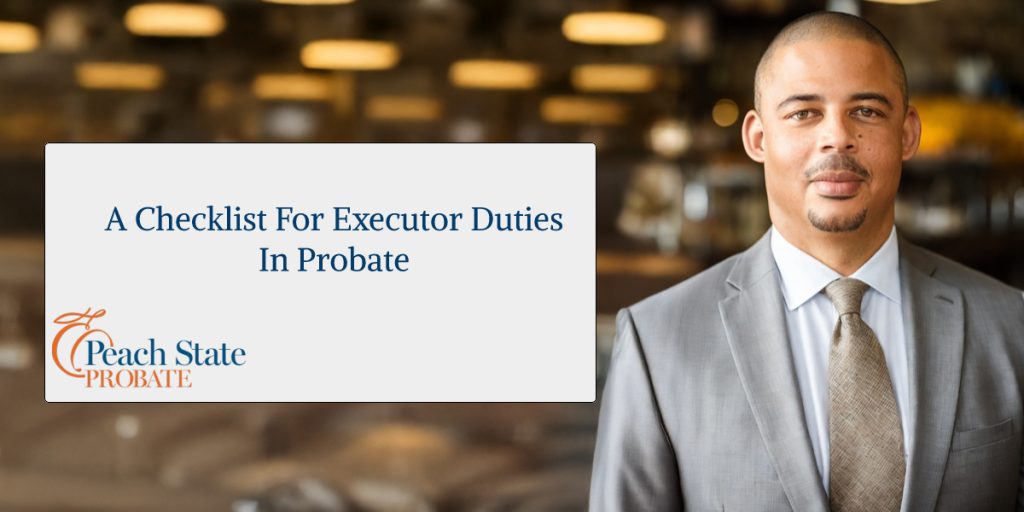A Comprehensive Overview of Executor Responsibilities in Probate
Executor duties are vital in guiding the probate process effectively, ensuring that the deceased’s wishes are respected and that affairs are managed professionally. Acting as the personal representative of the estate, the executor plays a crucial role in settling debts, distributing assets, and managing various administrative tasks. Understanding these duties is essential for fulfilling one’s responsibilities seamlessly and avoiding potential legal pitfalls.
At its core, executor duties encompass numerous tasks, including collecting assets, paying debts and taxes, and ultimately distributing the remaining estate to the beneficiaries. The executor must act with prudence and diligence, ensuring that all actions align with the law and the decedent’s wishes expressed in a will. Additionally, the executor may also need to navigate complex emotional dynamics among family members, particularly when disputes arise regarding the estate.
One crucial aspect of executor responsibilities includes maintaining detailed records of all transactions and communications throughout the probate process. This documentation not only ensures transparency but can also serve as vital evidence in case of disagreements with heirs or challenges to the will. Executors are expected to manage the estate responsibly and serve in the best interest of the beneficiaries while adhering to legal requirements effectively.
Understanding Executor Duties: What They Entail
Executor duties represent a range of responsibilities that an appointed individual must carry out after a loved one passes away. At the outset, an executor must review the will to understand their obligations and the wishes expressed by the deceased. This review includes determining the validity of the will and understanding any specific bequests made within it. If complications arise, such as the absence of a will or challenges to its validity, the nature of executor duties may shift considerably.
Following the will review, an essential executor duty involves gathering the decedent’s assets, which typically includes real estate, bank accounts, investments, and personal belongings. This process requires creating a detailed inventory that accurately reflects the estate’s total value. The executor must also properly secure and safeguard these assets until they are ready for distribution. Failing to account for or protect these assets can lead to financial losses for the beneficiaries or potential legal issues down the line.
Another crucial duty of the executor involves paying off any debts or taxes owed by the estate. This often entails filing the decedent’s final tax return, addressing outstanding debts, and notifying creditors of the probate proceedings. An executor must ensure that these debts are managed before any assets are distributed to beneficiaries, as failure to do so could expose the executor to personal liability for unpaid debts.
The Importance of Understanding Executor Duties
The significance of executor duties cannot be overstated, as these responsibilities can greatly influence the probate process’s outcome. For one, a competent executor fosters a feeling of trust among beneficiaries, ensuring that the estate is administered fairly and transparently. When beneficiaries feel confident that their loved one’s wishes are being honored, it can minimize conflicts and create a more harmonious environment throughout the probate process.
Understanding executor duties also helps prevent legal challenges to the will. The information and documentation generated during an executor’s tenure can be critical if beneficiaries dispute the will or question the executor’s decisions. Executors who prioritize their duties and keep accurate records often find it easier to defend their actions, should disputes arise. Thus, adequate knowledge of these responsibilities serves as a powerful preventative measure against possible litigation.
Additionally, awareness of executor duties facilitates timely administration of the estate. The probate process can be lengthy, and inefficient management can lead to frustrations for beneficiaries waiting for their inheritances. Executors who understand their responsibilities can navigate the key tasks efficiently, which ultimately reflects positively on their capabilities and the efficacy of the probate process.
Executor Duties: Legal Framework and Context
Executor duties are grounded in the legal framework established by state probate laws, which govern how estates are administered following a person’s death. This legal context varies from state to state; thus, having detailed knowledge of Georgia’s probate laws is crucial. Executors must adhere to statutory requirements pertaining to the probate process, which often includes filing the will with the probate court and obtaining letters testamentary, granting them authority to act on behalf of the estate.
Within this legal context, executors must understand deadlines as an essential part of their duties. Various documents must be filed within specific timeframes, and different forms of notice may need to be provided to beneficiaries and creditors. The failure to meet these deadlines could extend the probate process or result in penalties, ultimately undermining the executor’s ability to fulfill their obligations effectively.
Moreover, executor duties also include understanding the tax implications associated with estate administration. Executors must be aware of applicable federal and state tax laws, including estate taxes, income taxes, and inheritance taxes. Engaging with a CPA or tax professional during the probate process can be a valuable asset, allowing the executor to navigate these complexities judiciously and ensuring compliance with tax obligations.
Real-World Challenges and Examples of Executor Duties
Real-world situations involving executor duties often highlight the challenges that arise during estate administration. One common scenario involves conflicts among beneficiaries. An executor may find themselves in the difficult position of mediating disputes, such as disagreements over asset valuations or perceived inequities in the distribution of the estate. These conflicts can create significant emotional stress, making it critical for the executor to approach these conversations diplomatically and transparently, ensuring that all parties are heard.
Another potential hurdle for executors is managing the financial and legal aspects of the estate. For example, suppose a decedent owned multiple properties, each with unique tax liabilities or maintenance issues. The executor’s responsibilities would include determining how to manage these properties effectively, which may involve hiring property management services or coordinating with real estate professionals to ensure proper maintenance and timely sales if necessary.
In some situations, executors navigate complex legal challenges, particularly when the will is contested or when debts exceed the estate’s assets. Executors must operate strategically while remaining compliant with legal standards to protect their interests and those of the estate. This might involve negotiating with creditors, determining how to manage estate assets, or, in severe cases, opting for bankruptcy if the estate’s liabilities are unsustainable.
Practical Steps to Take as an Executor
Once appointed, an executor can streamline the probate process by following a strategic approach to managing their duties. Initially, it’s advisable for the executor to gather all necessary documents, including the will, bank statements, and property deeds. Creating a comprehensive checklist of these documents ensures that nothing is overlooked—and serves as a foundation for further actions. Assessing the estate’s overall value is crucial, as it guides the executor in understanding their responsibilities concerning debt payments and distribution.
Next, executors should set up a separate bank account for the estate. By maintaining distinct financial records, the executor minimizes the risk of co-mingling personal funds with those of the estate, a critical aspect of fiduciary duty. This separate account allows for transparent tracking of estate-related income and expenses, which will be essential when reporting to beneficiaries and during the final accounting process.
Additionally, it can be beneficial for executors to keep open lines of communication with beneficiaries throughout the process. Informing them about what steps are being taken and any significant developments fosters trust and may mitigate potential conflicts. By proactively addressing concerns and inviting questions, an executor can create a more collaborative environment, making the probate process smoother for all parties involved.
Common Pitfalls to Avoid in Executor Duties
Navigating executor duties carries potential pitfalls that can complicate the probate process and expose the executor to liabilities. A prevalent mistake is failing to understand and meet deadlines related to filings and notifications. Each state has specific laws regarding how promptly documents should be filed and to whom notice must be given. Missing these deadlines can severely delay estate distribution, frustrate beneficiaries, and may result in legal repercussions for the executor.
Another common error involves the improper handling of estate assets. Executors must ensure that assets are properly maintained, valued, and documented throughout the probate process. This includes safeguarding property, ensuring that insurance policies are active, and that debts are managed promptly. Oversights, such as neglecting to maintain a property or failing to address creditor claims, can lead to serious financial ramifications for the estate and potential liability for the executor.
Educating oneself on the nuances of the probate process is paramount, as inadequate knowledge can lead to missteps. Executors who act hastily without fully understanding their duties may inadvertently take actions that are against the deceased’s wishes or legal stipulations. Committing to a thorough review of the will, state laws, and best practices for estate management can help mitigate these risks significantly.
When It’s Time to Consult an Attorney
Although many executors attempt to handle their duties independently, certain situations may necessitate the guidance of an attorney specializing in probate law. One indicator that legal intervention is warranted is if the estate is extensive, involving intricate financial arrangements or numerous assets. In such cases, navigating the legal complexities alone can be overwhelming, and the assistance of an attorney can ensure compliance with laws and regulations.
Another reason to consult an attorney is when disputes arise among beneficiaries. If conflicts escalate or if beneficiaries contest the will, having legal representation can provide much-needed support to the executor. An attorney can guide the executor through the dispute resolution process, protecting their interests, and helping ensure a fair resolution for all parties involved.
Furthermore, if the estate faces considerable debts that may exceed the total value of assets, seeking legal advice can determine the best approach for managing the situation. Navigating bankruptcy or negotiating with creditors can be complicated, and an attorney can guide the executor in developing a strategic plan to address these financial obligations while minimizing risks.
The Advantages of Legal Representation in Executor Duties
Choosing to engage an attorney offers numerous benefits for those fulfilling executor duties. One primary advantage is the peace of mind that comes with having professional support throughout the probate process. An attorney well-versed in probate law can provide clarity on legal questions, address concerns, and guide the executor through the intricacies of state requirements. This support can alleviate stress and allow the executor to focus on fulfilling their responsibilities more effectively.
In addition, legal representation can help streamline the entire probate process, making it more efficient and less prone to errors. An attorney can assist in preparing and filing necessary documents accurately and in a timely manner, thereby reducing the likelihood of mistakes that could slow down the proceedings or lead to legal challenges. This proactive approach can also minimize the risks associated with potential liability for the executor, as the attorney can advise on best practices for estate management.
Moreover, having an attorney also enhances the executor’s credibility. Beneficiaries may feel more confident in the administration of the estate when they know the executor is receiving professional guidance on legal matters. This additional layer of assurance can foster trust and reduce tensions, contributing to a more amicable atmosphere during the often-sensitive probate process.
How Peach State Probate Can Assist Executors
Peach State Probate stands out as a premier choice for individuals seeking assistance with executor duties in Georgia’s probate process. With an in-depth understanding of state laws and best practices, the team at Peach State Probate offers tailored legal guidance that caters to the unique needs of each client. Their approach prioritizes client empowerment through education while ensuring that they have the necessary support throughout the entire administration process.
Clients can expect personalized services that address every aspect of executor duties, from initial probate filings to navigating complex legal challenges. The commitment to effective communication means that beneficiaries and executors alike are kept informed at every stage of the process. This transparent approach fosters trust and reinforces the importance of honoring the decedent’s wishes while navigating the intricacies of probate law.
Peach State Probate also emphasizes proactive strategies to manage potential disputes or challenges that may arise. By providing high-quality mediation and negotiation services alongside their comprehensive legal support, they help maintain courtesy and respect among involved parties, ensuring that the probate process remains as amicable as possible. With a reputation for excellence and a commitment to client satisfaction, Peach State Probate serves as a reliable resource for executors seeking to fulfill their duties effectively.
FAQs Regarding Executor Duties




